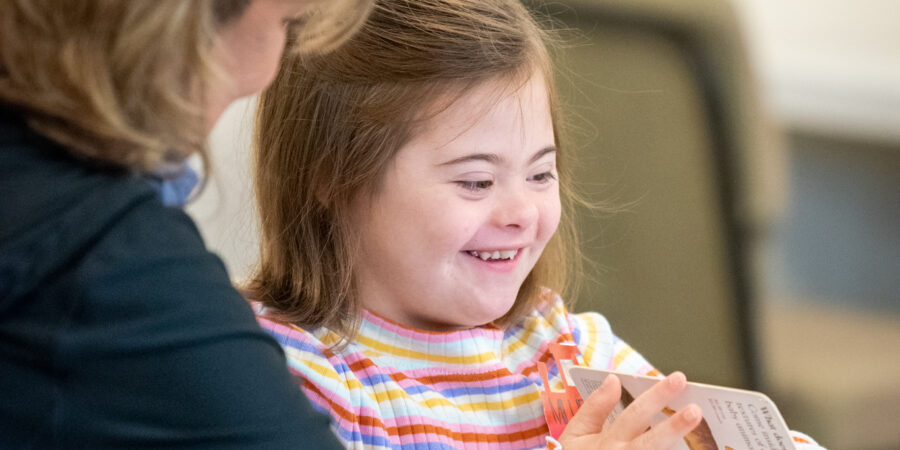You may ask, “Since beginning a disability ministry sounds like a lot of work, is this really needed and worth the effort?” My answer is “absolutely!” In my experience, it may be one of the most Christlike programs you will implement and life changing activities you will take part in.
There are several groups of people who benefit from having a disability ministry in your congregation. Those groups include: the person with a disability, their family members, and members of your congregation. In the next three posts, we will examine each of these groups and hopefully give insights as to why that group needs inclusion in our congregations.
Our Forever His program began in 2015 as a VBS/day camp type experience for our guests. At the beginning, one of my concerns was whether after going to so much effort, we would have anyone come! For that first camp, I set a goal of finding ten children to attend. We were blessed with fourteen. We continued having camps twice per year, spring and fall, (with the exception of 2020 & 2021 due to Covid), and with each camp, numbers increased. Enrollment during the last camp held was 60 children and adults! Since our numbers continue to grow, the decision has been made to separate the camp into two age groups so that we can continue to reach more people in our community. What a wonderful problem to have!
The first reason why the church needs to be involved in disability ministry is for the sake of the person with a disability.
We want to provide a very special experience for those who are typically left out of activities that others take for granted.
The success of this ministry is not primarily measured by how many converts we make from follow-up work, but first and foremost, whether we took advantage of the opportunity to serve others in the name of Jesus (Matthew 25:31-40). Whether a conversion ever results from this ministry or not, this ministry will be a success because we seized an opportunity to “go about doing good” just like Jesus (Acts 10:38).
While most of us have an abundance of opportunities for social interactions for ourselves and our children, the same is not true for everyone. For children with disabilities, ages 3-21, there is free public education. Depending on the level of need, most children will be integrated for a part or perhaps much of the school day into regular classrooms with typical peers. Some with more significant needs may spend their school day in special self-contained classroom with peers who have disabilities. However, once the school day is over and especially later when they age out of school programs, opportunities are minimal.
For those who live in a larger city, there may be programs outside of school that are accessible. Many have benefited from Special Olympics, therapeutic horseback riding, or even summer camps. However, such opportunities are quite rare (if existent at all) and may be cost prohibitive for families who already have expenses that far exceed the typical family’s budget.
Some may ask, “Why do we need a special program? Can’t they just attend our regular Bible class, Vacation Bible School or other activities?” They absolutely can and should. When it comes to our Bible class program, most children with disabilities should attend alongside their typical peers. Depending on their needs, an additional assistant may be necessary. Modifications to the Bible curriculum may have to be made. The key to having someone with a disability successfully attend typical Bible class is having a teacher who loves all children, is flexible, and is willing to make the necessary modifications and adaptations so that the class a successful experience for everyone.
While someone with moderate and severe needs may be able to fit into our Bible classes with modifications, their needs that differ from typical peers become far more pronounced when considering other church events such as a Vacation Bible School or camp. Consider the following questions that will arise:
- How will you be prepared for those who have seizures, a feeding tube, a catheter, or other medical needs?
- How do you accommodate an older child, teenager, or adult who is still wearing diapers?
- What about the person with autism who has severe behavior issues and extreme sensory sensitivities?
- What about those with special dietary restrictions?
- Are your facilities accessible for someone with mobility issues?
- Have you considered safety situations for a child with autism who may be a runner and have no regard for dangerous situations?
- How do you fully include a person with limited communication ability?
So, as you see, there are unique considerations when considering church programs and special events. But, we have found that by including these individuals, we get to see the smiles, receive the hugs, and share with them the love of Jesus, and that is priceless! We have had families drive as far as five hours away, just so their child could attend our program. You cannot imagine the overwhelming gratitude that has been expressed by the families who have brought their child to our camps.
The reoccurring message we keep hearing from so many of these families is pure delight to have found a church who welcomed them and understood them. Some have recounted painful “church experiences” in which they were told they weren’t welcome due to the challenges they presented.
We, as the Lord’s people, can do better than that! As a matter of fact, if we want to look like and live like Jesus, we WILL do better than that!
